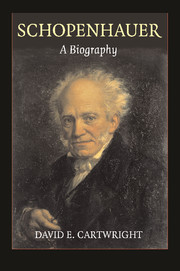Book contents
- Frontmatter
- Contents
- Preface
- Acknowledgments
- Notes on the Text
- Chronology of Schopenhauer's Life and Works
- 1 The Affirmation of the Will
- 2 A Tour for a Trade
- 3 A Father's Death; A Philosopher's Birth
- 4 The University Years
- 5 The Better Consciousness, Causes, Grounds, and Confrontations
- 6 Goethe, Colors, and Eastern Lights
- 7 The Single Thought of Dresden
- 8 Failure in Berlin
- 9 Ich Bin Kein Berliner
- 10 The Frankfurt Philosopher
- 11 The Dawn of Fame and the End of Life
- Works Cited
- Index
2 - A Tour for a Trade
Published online by Cambridge University Press: 05 April 2014
- Frontmatter
- Contents
- Preface
- Acknowledgments
- Notes on the Text
- Chronology of Schopenhauer's Life and Works
- 1 The Affirmation of the Will
- 2 A Tour for a Trade
- 3 A Father's Death; A Philosopher's Birth
- 4 The University Years
- 5 The Better Consciousness, Causes, Grounds, and Confrontations
- 6 Goethe, Colors, and Eastern Lights
- 7 The Single Thought of Dresden
- 8 Failure in Berlin
- 9 Ich Bin Kein Berliner
- 10 The Frankfurt Philosopher
- 11 The Dawn of Fame and the End of Life
- Works Cited
- Index
Summary
Arthur's decision to take the grand pleasure tour continued his father's strategy of having his son, as Arthur would later tell Carl Georg Bähr, “read from the book of the world.” This “reading” was designed to enable the young Schopenhauer to prepare for the life of an international merchant. Direct familiarity with other countries, the opportunity to hone his language skills, and personal interaction with his father's business associates and their acquaintances all supported the development of the cosmopolitan attitudes, knowledge, connections, and values that Heinrich Floris viewed as practicable for business success. This early and unconventional form of education played a formative role in Schopenhauer's intellectual development as a philosopher. It is almost as if reading from the book of the world became the keystone of Schopenhauer's philosophical methodology and one of the central bases for his critique of his philosophical hero, Immanuel Kant, whom he found to be working from judgments about things and not from the things in themselves. It was as if Kant tried to determine the height of a tower by measuring its shadow, Schopenhauer analogized, whereas his philosophy measured the tower itself. Even the drive itself to philosophize must spring from astonishment about the world, he claimed, and only a pseudo-philosopher is prompted to do so based on what some other philosopher has said.
- Type
- Chapter
- Information
- SchopenhauerA Biography, pp. 34 - 84Publisher: Cambridge University PressPrint publication year: 2010



